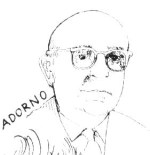Bein’ like Marty: Consequences for Philosophy’s Uneasy Relation to Science
February 17, 2009
“… quizzin’ me what it was like before everybody tried to be like Mike” (The Pride, Chuck D)

A minor annoyance in Lisa Randall’s excellent book on contemporary theoretical physics, Warped Passages, is the choice of song lyrics used as epigraphs for each chapter. But her use of those lyrics, apart from once again confirming that physicists often have a strange sense of aesthetics, gives me a dispensation to engage in a writing practice that usually bodes no good: hence the poorly and shamefully paraphrased title of this blog entry and reference to an outstanding old school hiphop album, Mistachuck (1996).
It would be tempting to say that this entry is about a sort of deontology: how philosophers and social theorists should deal with science. Randall refers to a well-known example:
“Radical as the fundamentals of quantum mechanics were, it’s easy to overreach when applying them to nonscientific contexts. I find the most bothersome example to be the frequently abused uncertainty principle…”(Warped Passages, p.117).
René Thom, most commonly identified with his work on Catastrophe Theory, provides us with another example. In Stop Chance! Silence Noise!, which appeared in the journal SubStance in 1983, Thom discusses many contemporary epistemologists’ misuse of the mathematical notion of randomness. He attributes this practice to “deliberate mental confusion” and condemns the culture of “artistic fuzziness”.
In the third chapter of my doctoral thesis (Les Antinomies de la critique, Université de Montréal, 1991), I examine the misuse of mathematical metaphors in Jean-François Lyotard’s description of post-modernity. In particular, I show how Lyotard exercised a serious lack of caution in dealing with Kurt Gödel’s work on completeness.
So here we have a triad of concepts popularly used by philosophy to describe our contemporary (post-modern) situation: uncertainty, randomness, undecidability. Each of these concepts is in fact metaphorically borrowed from mathematics or the physical sciences. I would suggest that the questionable use of this type of metaphorical appropriation of complex scientific ideas is surely the result of a combination of poor science education and deliberate attempts at obfuscation. Yet these two elements are not completely sufficient to explain this sort of intellectual shoddiness.
Of course, as banal as it seems to say this, poor science education is indeed part of the problem. Former Caltech president (and Nobel Prize winner) David Baltimore has convincingly spoken and written about (the lack of) science education in the United States. In a time when familiarity with basic scientific concepts seems increasingly necessary, it appears that North American society has actually taken a step backwards. Although they should know better, professional academics in the humanities and social sciences can actually exacerbate the problem. Most often they either avoid confronting complex problems (because of a mistrust of scientific logic) or apply comic book style simplification to difficult ideas. Of course, it is true that the complexity of many scientific concepts (say in 20th century theoretical physics) makes these concepts difficult to popularize. For example, a person with no experience of elementary physics could find the reading of even the best popularizing authors, such as Lisa Randall or Brian Greene, a challenge. (It’s not that good material which can help educated individuals understand trends in contemporary science doesn’t exist; in this regard, I have to mention my favorite science series , Berkeley Groks, available on the internet at U Cal Berkeley.) However, not even poor science education can excuse what Thom referred to as deliberate obfuscation. Lack of understanding does not have to translate into lack of respect of ideas. Some of this type of disrespect can simply be attributed to certain very poor choices.
A possible precursor to these “poor choices” may be found in the famous Davos conference of 1929, which cultural historians tend to interpret as a sign of the beginning of Heideggerean ascendancy in Western philosophy. While we can perhaps understand the attraction that the developing thought of Heidegger may have exercised in segments of the German academic milieu of the period, it is difficult to sustain the idea that his understanding of philosophy and culture was superior to Cassirer’s. For example, although they somehow fell out of fashion in the Saussurean inspired structuralist and semiological boom of the the 60’s and 70’s , Cassirer’s three volumes on symbolic forms must be judged an outstanding contribution to Western thought. And, in the context of our discussion here, I would point out that Cassirer’s section dealing with mathematics in volume 3 of that series is an exemplary treatment of that subject and is truly a standard by which we can judge subsequent philosophical writing on mathematical thought. When we think of the advances in the sciences at the time of the Davos meeting (e.g. the work then being done on Quantum Theory), it is somewhat surprising that a style of thought which fails to confront scientific logic could be preferred over the sophisticated thought of Ernst Cassirer.
We could also measure Heidegger against his mentor Husserl. With respect to our problematic here, does not Husserl’s The Crisis of European Sciences (1935) contain certain exemplary texts (such as his essay on the origins of geometry)? We can certainly retain two very fundamental ideas from Husserl. First, to understand and practice a science, we need to somehow get back to the problems, logic and spirit out of which it developed. (Here science is understood as a theoretical endeavor based on mathematical logic and not a practice of simple collection and classification of data). Secondly, we have to critically examine the relation of science and technology (applied science) in order to prevent the denaturing of science by its reduction (and transformation) to simply a source of technological advancement. In the understanding of these types of questions, Heidegger (the pupil) was certainly not up to the standards of Husserl (the teacher). Given the current consensus that the amazing development of the sciences was probably the determining factor in the evolution of Western civilization in the last century, it is difficult to understand how so many philosophy departments have preferred to give special status to trends of thought which derive from the linguistic and ontological based thinking of Heidegger. The consequence of this is not only the subsequent formation of a contingent of academics unable to properly deal with scientific thinking, but also the abandoning of a whole range of philosophical domains to scientists and “analytical experts” who are now the only academics adequately prepared to deal with questions that were traditionally also the domain of philosophers. For example, although Derrida wrote an excellent thesis on Husserl’s The Origins of Geometry, it would be difficult to build on his writings (or the writings of a once popular lesser thinker like Lyotard) to construct a position from which we could hope to adequately confront the type of questions that contemporary scientific thinking poses. This is not to ignore a certain merit in (especially) the early writings of Derrida or to naïvely underestimate the contributions of Heidegger to the “science” of the lifeworld which Husserl wished to develop, but rather to affirm the inadequate nature of those lines of thinking in the context of the problematic discussed here.
The literary theorist Wlad Godzich, one of whose doctoral seminars I was fortunate to have attended, once remarked that philosophical theorists must essentially start by privileging one principal element; History, Logic, Language are three of the obvious choices. Has not the priority given to Heideggerean based philosophy (especially his writings after die Kehre) not led us to badly relate to science , a domain where logic is the prime element?
Do we not find a similar type of difficulty in Adorno, probably the most important philosopher since the Weimar years? Dialectic of Enlightenment was the centerpiece of my doctoral thesis and it would be on the short list of the most important philosophical texts of the last century. Its logic is implacable and its power is unquestionable. Yet, is it not possible that Adorno also jumped too quickly to characterizing science’s essence as immediately defined by manipulation, domination and exploitation of Nature (here understanding Nature as a Subject)? Does mathematical logic necessarily subordinate life to the concept of equivalence? In Adorno and Horkheimer’s construction of the dialectic of Myth and Reason, science gets assimilated by technology and capitalism in Myth’s revenge against Enlightenment. There can be none of the classical “disinterested” pleasure in science or mathematical logic.
Of course, given their Marxian perspective, Adorno and Horkheimer’s writings operate on a more comprehensive level than that occupied by the other philosophers mentioned here. They refer back to the meaning of “bein’ like Mike”, being assimilated in the world capitalist system and, of course, the concomitant Kulturindustrie. Science certainly operates in ignorance of economic determinism at its own peril. Like Michael Jordan, it can leave itself open to critique on how it relates to society. But when we look at how we ourselves deal with science, Heidegger and Adorno, probably the dominant thinkers of the last century, leave us no room to adequately confront the question. Heidegger is not up to task; Adorno leaves us no room to do it. We do get more from Adorno because he does not ignore the relation between science and capitalism. However, it is undoubtedly time to return to the the problematic of the epoch that parented these thinkers and take another, longer and less naïve look at how, from our “post-modern” perspective, we can avoid the current unacceptable situation. But we must not forget that it is necessary to have a modicum of understanding of how science works before trying to place it in an appropriate philosophical context.

Heidegger

Adorno
March 1, 2009 at 2:40 pm
A comment on Adorno’s idea of science dominating nature.One of my most compelling intellctual experiences during my undergraduate education was finding out about the derivation of the laws of planetary motion from Newton’s gravitational inverse square law and his “force equals mass times acceleration” principle using a few pages of standard calculus and vector notation.
Nevertheless one cannot conclude here that mankind is now able to dominate the motion of let’s say Jupiter.All one can say is that Newton’s two principles are equivalent to Kepler’s laws of planetary motion.
Sure , these laws have been used to send humans to the moon ,but also to invent missiles (admirably illustrated by Pynchon in “Gravity’s Rainbow”).Is this not an exemplary example of moral choice of how to apply the laws of nature?
One final note.It should be pointed out that Husserl’s PhD thesis was on the “calculus of variations” ,one of the mathematical techniques Einstein needed in his discussion of General Relativity , and that Cassirer wrote a well known book analyzing the very same theory.Both of these thinkers were well versed in the discipline of the exact sciences.
Johannes de Bruyn